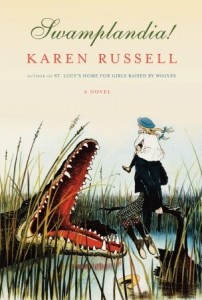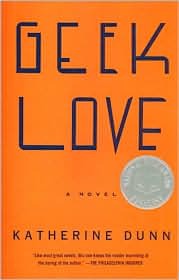 I’m reading (the non-romance) Swamplandia by Karen Russell. Most of the time I just sit there with my mouth hanging open thinking, Really? It’s so wacky. A Florida theme park devoted to alligator wrestling. Three painfully isolated and insulated children struggling to remake their worlds after their mother’s death and the park’s closing. One sibling converses with ghosts, another raises a baby red alligator, the third tries to make money at a competitor theme park. The mind boggles. The writing is beautiful, but ninety percent of the time I can’t enjoy it because my brain is screaming its disbelief. (And I loved Geek Love by Katherine Dunn, which is even wackier and even more decidedly NOT for the faint of heart, and, lest you be deceived by the title, NOT A ROMANCE.)
I’m reading (the non-romance) Swamplandia by Karen Russell. Most of the time I just sit there with my mouth hanging open thinking, Really? It’s so wacky. A Florida theme park devoted to alligator wrestling. Three painfully isolated and insulated children struggling to remake their worlds after their mother’s death and the park’s closing. One sibling converses with ghosts, another raises a baby red alligator, the third tries to make money at a competitor theme park. The mind boggles. The writing is beautiful, but ninety percent of the time I can’t enjoy it because my brain is screaming its disbelief. (And I loved Geek Love by Katherine Dunn, which is even wackier and even more decidedly NOT for the faint of heart, and, lest you be deceived by the title, NOT A ROMANCE.)
Speaking of Wonkomance, there is a paranormal love story in this book. The older sister falls in love with and has sex with a ghost, a dead dredgeman. She elopes with him and follows him to the underworld to live forever. Or maybe she doesn’t. That’s the difference between whacked out literary novels and paranormal romances. In whacked out literary novels, there’s ambiguity. The older sister is maybe crazy or maybe for real, and the younger sister who tracks her with a Bird Man aboard her boat is maybe deluded and maybe a hopeless romantic and a faithfully devoted sibling. (I confess to missing ambiguity less than I thought I would when I defected from reading mainly literary novels to reading mainly romance. I always had a grumpy relationship with not quite knowing WHAT THE HELL WAS GOING ON.)
Someone told me you either love or hate Swamplandia. And sure enough, when my book circle met last night, it  quickly divided into those that loved and those that hated. The readers who loved it were captivated by its weirdness, transported. They felt that they’d been given a glimpse of something rare and startling, like an orchid. The ones who hated it felt that Karen Russell had tried too hard and overreached. They felt that you could see the seams of her striving to be different. It a way, it came down to what people could believe, which came down to what they’d experienced. The more someone’s own experience included the odd, the ungainly, the unusual, or the egregious, the more willing they were to believe that Russell was just capturing the fringes of reality. And if they believed she was recording rather than inventing, they approved. It struck me how much we want our fiction to be, at bottom credible. We know it’s not fact, but we want it to be true. If we get wind of the fact that it’s crafted and not observed, we rebel.
quickly divided into those that loved and those that hated. The readers who loved it were captivated by its weirdness, transported. They felt that they’d been given a glimpse of something rare and startling, like an orchid. The ones who hated it felt that Karen Russell had tried too hard and overreached. They felt that you could see the seams of her striving to be different. It a way, it came down to what people could believe, which came down to what they’d experienced. The more someone’s own experience included the odd, the ungainly, the unusual, or the egregious, the more willing they were to believe that Russell was just capturing the fringes of reality. And if they believed she was recording rather than inventing, they approved. It struck me how much we want our fiction to be, at bottom credible. We know it’s not fact, but we want it to be true. If we get wind of the fact that it’s crafted and not observed, we rebel.
That’s the problem with being a boundary-pusher: If you portray the people and the stories that are toward the shared center of what we’ve experienced, you may not wow readers or change the world, but you will also not activate that irritable disbelief that makes people actively HATE a book like Swamplandia. It’s risky, being out there at the marginal edge of what can happen, and the best you can hope for, if you write stuff that’s so edgy, is that fifty percent of your readers will love it and fifty percent will hate it. Which is why no one writes Wonkomance on purpose. We write it because our characters persist in being wonky, despite our trying to make them mainstream, or because we just have to “let the characters do their thing” and that’s what happens. But people mostly don’t set out to write Wonkomance. “I think I’ll rule out half my audience!” is just not a good numbers game.
(It’s worth noting that a good portion of the books we now consider classics started in this cutting-edge purgatory. If everyone who wrote tried their damnedest to occupy the safe center, we would all be bored to death before we could have grim apocalyptic outcomes like the one in Cormac McCarthy’s The Road, another you-love-it-or-hate-it book that is destined to become a classic.)
I have a suspicion that we’re safe from that outcome, though, because I’m fairly certain that if you’ve got the wonky gene, you can’t shut it down. I suspect that when wonky writers try to write the wonk out, they mostly end up losing their je ne sais quoi. And then, instead of fifty percent of their readers saying, “REALLY?” and the other fifty percent saying, “This is f—king brilliant,” a hundred percent shrug and put the book down and forget they were in the middle of it.
The trick is to be contented with your half-size audience and write the hell out of your wonky characters for them. So in fact, “you either love this book or you hate it” will become praise you’ll someday celebrate, instead of ticking off good and bad Goodreads reviews and living or dying on the tally.






















If it helps at all, Gator Land is a central Florida theme-park-ish place with alligator wrestling, and with a multitude of other quirky theme parks in easy reach. Not just Disney and Universal, but Silver Springs, Busch Gardens, Holy Land Experience, etc. And Florida is a really weird place. I bet people who live here tilt heavily onto the ‘yes, there’s reality like this’ side. Well, not the ghosts, but the boats and the swamps and the gators and the theme parks all sound like home to me.
I sort of faintly knew that (Carl Hiassen and some personal experience), but it didn’t completely help with my suspension of disbelief problems. It only made me feel more caught between “It’s really like this!” and “Why don’t I believe what she’s telling me?!” And it wasn’t for lack of details. It might have been the accumulation of oddities–wacky setting, strange, slightly dispassionate characters, and some beautifully tricky word choices that made it seem like the author was always, always reaching in a way that didn’t let me forget she was there.